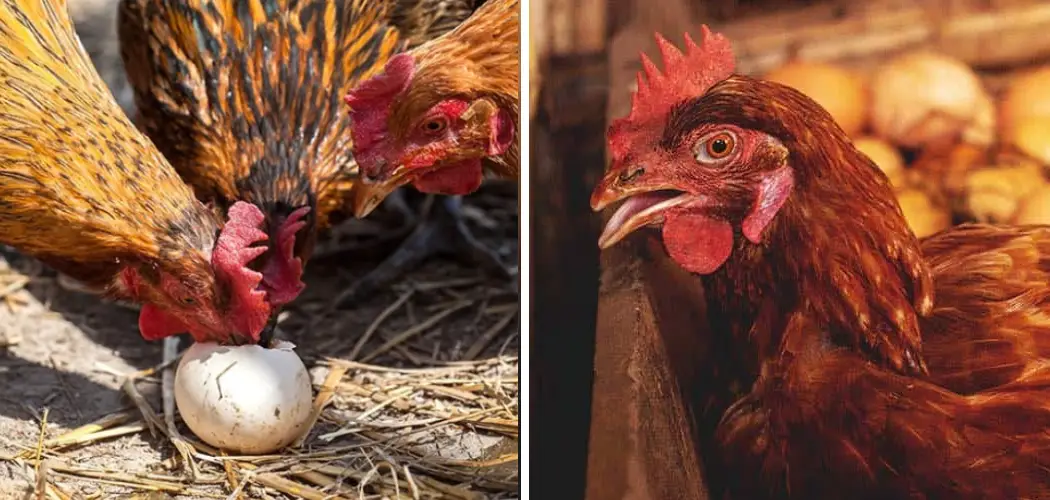When chickens begin to eat their eggs, it can be a frustrating problem for chicken owners. Not only does it mean lost eggs and potential profit, but it can also lead to aggressive behavior among the flock as they fight over the opportunity to eat the eggs.
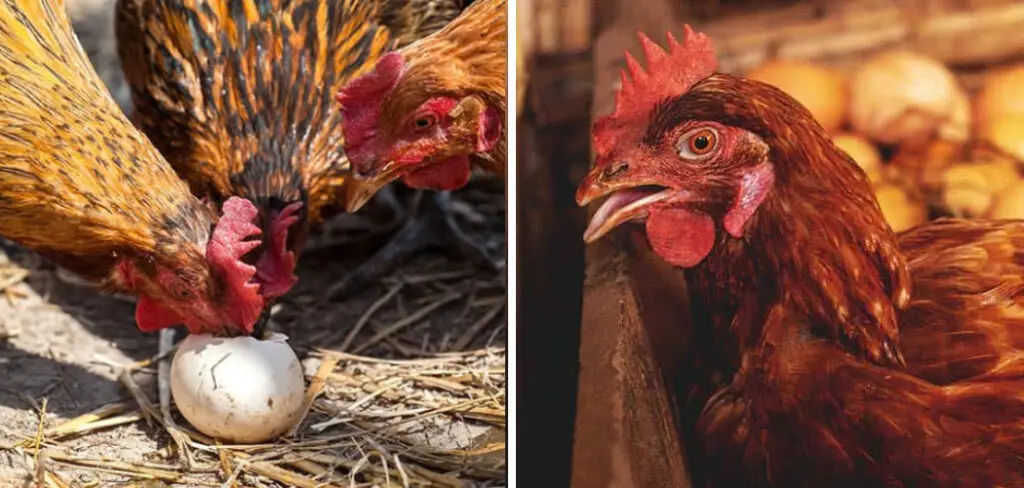
While there are many factors that can contribute to this behavior, there are several steps that you can take to prevent or stop chickens from eating their eggs. In this guide on how to stop chickens from eating their eggs, we will discuss some of the common reasons why chickens may start eating their eggs and ways to address this issue.
Necessary Items
Before we dive into the solutions, it’s important to have a few items on hand to help stop chickens from eating their eggs. These include:
- A collection basket or bin
- Egg collecting apron (optional)
- Fake or ceramic eggs
These items will be useful in implementing the strategies discussed below.
12 Steps on How to Stop Chickens From Eating Their Eggs
Step 1: Collect Eggs Frequently
One of the simplest ways to prevent chickens from eating their eggs is to regularly collect them before the chickens have a chance to peck at them. Depending on your flock size and egg production, this may mean collecting eggs multiple times a day.
Step 2: Provide Adequate Nesting Boxes
Chickens need a safe and comfortable place to lay their eggs. Make sure you have enough nesting boxes for your flock and that they are filled with clean bedding, such as straw or shredded paper. And remember, chickens can be picky about their nesting boxes, so make sure they have enough space and that the boxes are in a quiet and secluded area.

Step 3: Keep the Nesting Boxes Clean
Dirty or soiled nesting boxes can also contribute to egg-eating behavior. Make sure to clean out the nesting boxes regularly to keep them free of droppings or broken eggs. Even a small crack in an egg can entice chickens to start pecking and eating the contents.
Step 4: Provide Proper Nutrition
As mentioned earlier, a lack of proper nutrition can lead to egg-eating behavior. Make sure your chickens have access to a balanced diet that includes enough protein and calcium. You may also want to consider providing supplements or treats specifically designed for chicken health.
Step 5: Increase Space and Enrichment
If your chickens are living in a small or overcrowded space, they may become bored and stressed, leading to egg-eating. Consider providing more space for your flock to roam and adding enrichment activities like hanging treats or toys for them to peck at.
Step 6: Add Fake Eggs to the Nesting Boxes
Chickens are creatures of habit and may stop eating their eggs if they realize there is no reward. You can trick them by adding fake or ceramic eggs to the nesting boxes, which will discourage them from pecking at their own eggs.
Step 7: Mark Eggs With a Sharpie
If you suspect that only certain chickens are eating the eggs, you can try marking the eggs with a Sharpie. This will help you identify which chickens may be responsible and allow you to take necessary measures, such as separating them from the flock.

Step 8: Check for Egg-Eating Chickens
Sometimes, egg-eating behavior is passed down from older chickens to younger ones. If you notice any of your chickens pecking at eggs, remove them from the flock and keep them separate until the behavior stops.
Step 9: Use Rollaway Nest Boxes
Rollaway nest boxes are designed to have a slanted or curved bottom, causing eggs to roll away from the nesting area once they are laid. This prevents chickens from being able to reach and peck at their eggs.
Step 10: Keep Eggs Out of Sight
Chickens are curious creatures and may be tempted to eat their own eggs if they see them lying around. Make sure to remove any broken or cracked eggs from the coop immediately and keep collected eggs out of sight until you can safely store them.
Step 11: Address Underlying Health Issues
Sometimes, egg-eating behavior can be a sign of underlying health issues in chickens. If all other solutions have failed, it may be worth consulting a veterinarian to rule out any potential medical causes.
Step 12: Be Patient and Persistent
Stopping chickens from eating their eggs may take time and patience. Continue to monitor your flock and make necessary adjustments until the behavior stops completely. Even if you have successfully stopped them from eating eggs, it’s important to continue implementing these strategies to prevent the behavior from resurfacing.
There are many strategies and steps that can be taken to stop chickens from eating their own eggs. By understanding the reasons behind this behavior and taking proactive measures, you can help your flock stay healthy and happy while also preserving your precious eggs.
Remember to regularly collect eggs, provide proper nutrition and space, and be patient with the process. With diligence and perseverance, you can successfully prevent or stop chickens from eating their eggs.
9 Safety Measures to Prevent Salmonella Poisoning from Eggs
While dealing with egg-eating behavior, it is important also to consider the safety of consuming eggs from your flock. Here are some safety measures to prevent salmonella poisoning:
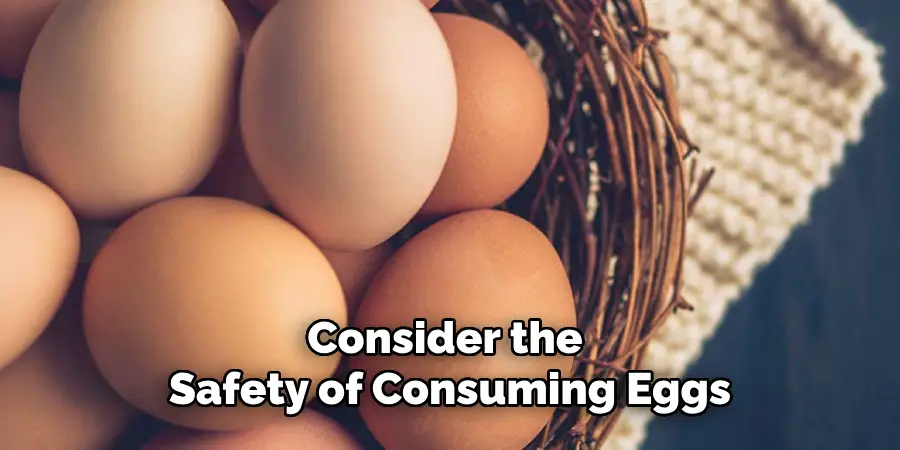
1) Wash Your Hands and Eggs Before Handling
Always wash your hands with soap and water before and after handling eggs. Also, make sure to wash the eggs with warm water to remove any potential bacteria on the shell. Also, discard any visibly dirty or cracked eggs.
2) Clean and Disinfect Coop Regularly
Keeping a clean coop is essential for preventing the spread of bacteria, including salmonella. Regularly clean and disinfect all surfaces, nesting boxes, and feeders/waterers to maintain a healthy living environment for your flock.
3) Use Separate Incubators for Fertile and Store-Bought Eggs
If you are hatching fertile eggs, make sure to use a separate incubator from where you store your store-bought eggs. This reduces the risk of cross-contamination. However, always wash your hands and disinfect the incubator before handling eggs or chicks.
4) Store Eggs Properly
After collecting eggs, make sure to store them in a cool and dry place. Avoid storing them near raw meat or other potential sources of bacteria. Also, never leave cracked or broken eggs in storage, as they can easily become contaminated.
5) Cook Eggs Thoroughly
Properly cooking eggs is the best way to prevent salmonella poisoning. Make sure to cook eggs until both the yolk and white are firm. Avoid eating raw or undercooked eggs, especially if you have a weakened immune system.
6) Don’t Wash Eggs Before Storing
Washing eggs before storing them can actually increase the risk of salmonella contamination. The water can push bacteria through the pores of the shell, so it is best to only wash eggs right before use.
7) Use a Dedicated Egg Basket
To avoid cross-contamination, use a separate egg basket or container to collect and store fresh eggs. This prevents any potential bacteria from spreading to other surfaces in your kitchen. Right before use, wash the eggs and wipe down the basket/container with disinfectant.
8) Avoid Keeping Eggs for Too Long

It is best to consume fresh eggs within a week of collecting them. The longer you keep eggs in storage, the greater the risk of bacteria growth. If you have an excess of eggs, consider freezing or preserving them rather than keeping them in storage for too long.
9) Educate Yourself and Your Family
Make sure to educate yourself and your family on the proper handling and safety measures for consuming eggs. Inform them about the risks of salmonella poisoning and how to prevent it, especially if you have young children or anyone with a weakened immune system in the household.
By following these safety measures on how to stop chickens from eating their eggs, you can enjoy fresh and nutritious eggs from your flock without worrying about potential health risks.
Overall, preventing egg-eating behavior in chickens and ensuring the safety of their eggs go hand in hand with maintaining a healthy and thriving flock. With proper care and attention to detail, you can successfully raise happy and productive chickens while also enjoying delicious homegrown eggs.
8 Things to Avoid When Raising Chickens
While learning about how to prevent egg-eating behavior and ensure the safety of your eggs, it is also important to be aware of common mistakes or practices that can harm your flock. Here are 8 things to avoid when raising chickens:
1) Overcrowding
Overcrowding in a coop can lead to stress, aggression, and an increased risk of disease in chickens. Make sure to provide enough space for your flock to roam and roost comfortably. If your chickens are showing signs of distress or becoming aggressive, it may be a sign that your coop is too small.
2) Poor Nutrition
Chickens need a balanced and nutritious diet to stay healthy and produce high-quality eggs. Make sure to provide them with a feed specifically formulated for their age and needs, as well as access to fresh water at all times. Avoid giving them excessive treats or scraps that can be harmful to their health.
3) Improper Ventilation
A well-ventilated coop is crucial for the health and well-being of your chickens. Poor ventilation can lead to a build-up of ammonia from chicken droppings, which can cause respiratory issues. Make sure your coop has enough windows or vents to allow for proper air circulation.

4) Lack of Cleanliness
A dirty coop is not only unpleasant for your flock, but it can also pose health risks. Make sure to regularly clean and disinfect your coop and replace old bedding with fresh, dry material. This will help prevent the spread of bacteria and parasites in your flock.
5) Neglecting Egg Collection
Leaving eggs in the nest for too long can lead to egg-eating behavior among chickens. Make sure to regularly collect eggs, especially during peak laying season. This also helps prevent cracked or dirty eggs from being consumed.
6) Failure to Quarantine New Birds
Introducing new birds into your flock without proper quarantine can potentially introduce diseases and parasites that can harm your existing flock. Make sure to quarantine new birds for at least 30 days before integrating them into the main flock.
7) Predators
Properly securing your coop and run is essential for protecting your chickens from predators such as foxes, raccoons, and hawks. Regularly check for any potential entry points or weak spots in your fencing, and make sure to lock up your flock at night.
8) Lack of Attention or Care
Raising chickens requires regular attention and care. Neglecting your flock can lead to health issues, injuries, or even death among your chickens. Make sure to check on your chickens daily and address any potential problems promptly. Additionally, take the time to handle and interact with your chickens to build a bond and trust with them.
By avoiding these common mistakes, you can ensure the health and well-being of your flock while also enjoying the benefits of raising chickens. Remember to always prioritize their safety and provide them with proper care for a happy and productive flock.
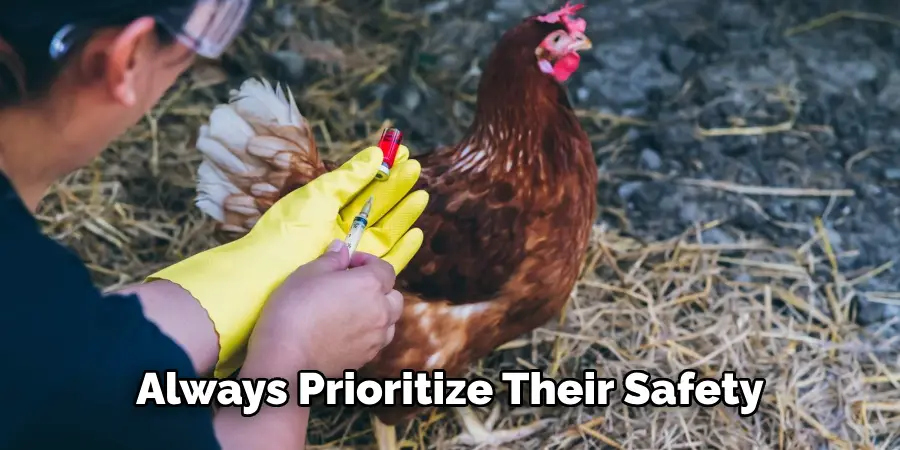
Overall, keeping chickens can be a rewarding experience as long as you are willing to put in the time and effort to properly care for them. So go ahead and start your own backyard flock, and enjoy the many benefits of raising chickens!
8 Additional Tips for Raising Happy and Healthy Chickens
While avoiding common mistakes is important, there are also additional tips that can help you raise happy and healthy chickens. Here are 8 more tips to consider:
1) Provide Enrichment Activities
Chickens are social creatures and thrive with mental and physical stimulation. Consider providing them with enrichment activities such as perches, dust baths, and toys to keep them entertained and engaged.
2) Allow for Free-Range Time
Allowing your chickens to free-range in a safe and supervised area can provide them with exercise, fresh air, and a diverse diet. It also allows them to exhibit natural behaviors such as scratching and foraging.
3) Regularly Trim Beaks and Nails
Overgrown beaks and nails can cause discomfort and even health issues for chickens. Make sure to regularly trim them to keep your flock healthy and comfortable. Softer materials such as sandpaper or concrete blocks can also help naturally wear down their beaks and nails.
4) Keep a Clean Water Source
Chickens need access to clean water at all times for proper hydration. Make sure to regularly change and clean their water source to prevent the spread of bacteria and diseases. Then, make sure to provide fresh water daily.
5) Watch for Signs of Illness
Being familiar with the normal behaviors and appearance of your chickens can help you quickly identify any signs of illness. If you notice something unusual, consult a veterinarian or do some research to determine the best course of action.
6) Consider Using Natural Remedies
There are many natural remedies that can help prevent and treat common health issues in chickens without the use of harsh chemicals. Research and consider using natural alternatives such as essential oils, apple cider vinegar, and herbs.
7) Rotate Grazing Areas
Rotating your flock’s grazing areas can help prevent overgrazing and reduce the build-up of parasites in one area. It also provides your chickens with fresh grass and insects to forage on.
8) Join a Community or Group
Raising chickens can be a great way to connect with others who share the same interests. Consider joining a local community or online group where you can learn from experienced chicken owners, ask questions, and share your own experiences.
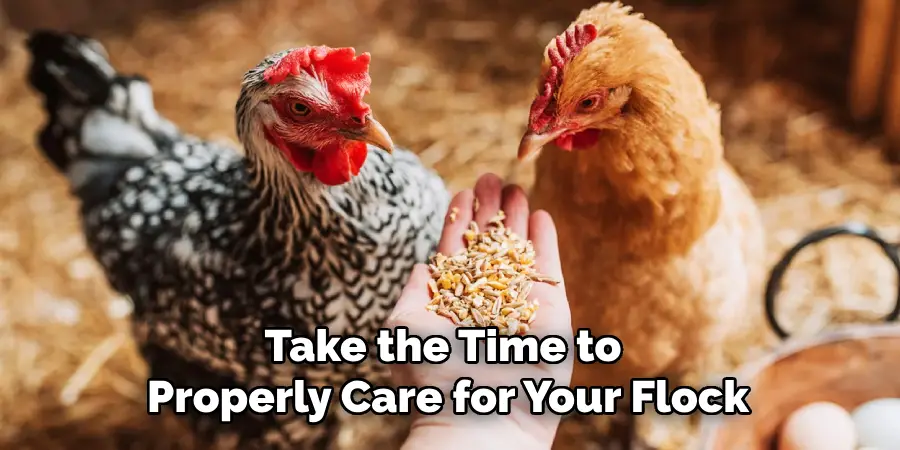
With these additional tips on how to stop chickens from eating their eggs, you can ensure that your chickens are not only healthy physically but also mentally and emotionally. Remember, happy chickens lay the best eggs! So take the time to properly care for your flock and enjoy all the benefits of raising chickens in your own backyard.
Frequently Asked Questions
How Many Chickens Should I Get for My Backyard Flock?
The number of chickens you can have in your backyard will depend on the size and zoning regulations of your area. As a general rule, 4-6 chickens per 100 square feet is recommended for adequate space and ventilation. However, it’s important to check with your local laws and regulations before getting chickens.
What Do Chickens Eat?
Chickens are omnivorous and can eat a variety of foods. A balanced diet for chickens includes a mixture of grains, protein, vegetables, and calcium sources. You can also give them occasional treats such as fruits or mealworms.
How Do I Keep My Chickens Warm in the Winter?
Chickens are naturally equipped to withstand cold temperatures, but providing them with a warm and dry shelter is essential. Make sure their coop is well-insulated and draft-free, and consider using a heat source such as a ceramic heat lamp or heated perch.
How Often Should I Clean the Coop?
Cleaning the coop regularly is important for the health and well-being of your chickens. Depending on the size of your flock, it’s recommended to clean out their coop at least once a week. However, spot cleaning and removing waste daily can help reduce build-up and make weekly cleanings easier.
Can I Keep Chickens in the City?
Many cities now allow backyard chicken keeping, but it’s important to check with your local laws and regulations before getting chickens. Be sure to follow any guidelines or restrictions in place, such as the number of chickens allowed per household. Additionally, consider the noise level of roosters and make sure they are not prohibited in your area.
Conclusion
Raising chickens can be a fun and rewarding experience for you and your feathered friends. By avoiding common mistakes and following these additional tips on how to stop chickens from eating their eggs, you can ensure the health and well-being of your flock while also enjoying fresh eggs and a closer connection with nature.
Remember always to prioritize their safety, provide them with proper care, and enjoy all the benefits of raising chickens in your own backyard. So go ahead and start your own flock today!
About
Outdoor Fixes is a distinguished figure in the world of Diy design, with a decade of expertise creating innovative and sustainable Diy solutions.
His professional focus lies in merging traditional craftsmanship with modern manufacturing techniques,
fostering designs that are both practical and environmentally conscious. As the author of diy,
outdoorfixes delves into the art and science of outdoorfixes-making, inspiring artisans and industry professionals alike.
Education RMIT University
(Melbourne, Australia) Associate Degree in Design (Outdoor Fixes) Focus on sustainable design, industry-driven projects,
and practical craftsmanship. Gained hands-on experience with traditional and digital manufacturing tools, such as CAD and CNC software.
Nottingham Trent University
(United Kingdom) Bachelor’s in outdoorfixes.com and Product Design (Honors) Specialized in product design with a focus on blending creativity with production
techniques. Participated in industry projects, working with companies like John Lewis and Vitsoe to gain real-world insights.
Publications and Impact
In diy, Outdoor Fixes his insights on indoor design processes, materials, and strategies for efficient production.
His writing bridges the gap between artisan knowledge and modern industry needs, making it a must-read for both budding designers and seasoned professionals.

